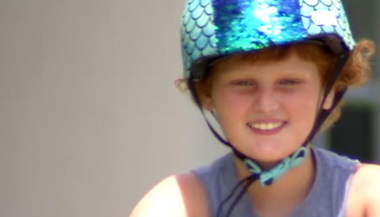Patient Story
Acute Myelogenous Leukemia: Callista's Story
Callista's Extraordinary Story
Patient Story Highlights
- Baby Callista, a 13-month-old with Down syndrome, is battling acute myeloid leukemia (AML) at Johns Hopkins All Children's Hospital in St. Petersburg, Florida.
- Children with Down syndrome have a higher risk of developing AML before age 5.
- Callie undergoes chemotherapy cycles with long hospital stays, and her parents find support in the dedicated nursing staff.
- Callie has completed three rounds of chemotherapy and has three more to go.
- Advances in medicine and specific protocols have improved outcomes for children with Down syndrome who get AML.

Sir Isaac Newton’s first law of motion: An object in motion will stay in motion unless acted upon by an unbalanced force.
Baby Callista is a bright and bubbly embodiment of Newton’s first law.
This 13-month-old is on the move — and, to date — there hasn’t been a force mighty enough to stop her. Not Down syndrome (trisomy 21), nor multiple heart defects, nor a parade of other medical maladies that have stood in her path.
Not even cancer.
“She’s pretty happy all the time, although her sass is coming out,” her mom Pauline says, with a laugh.
Callista, or “Callie,” is a fan favorite on floor 7 South, the Cancer & Blood Disorders unit of Johns Hopkins All Children’s Hospital in St. Petersburg, Florida. She adores tooling around in her bright pink remote-controlled “bumper car,” powered by her mom or dad.
Callie will greet you with the entirety of her 20-pound body, flashing a megawatt smile, her little arms and legs kicking in concert with her joy.
But while her spirit is mighty, her clinical diagnosis is sobering …
Acute Myeloid Leukemia
Callie has Callie has acute myeloid leukemia (AML), an aggressive form of blood cancer. It’s characterized by an over-production of immature white blood cells. (AML), an aggressive form of blood cancer. It’s characterized by an over-production of immature white blood cells.
AML occurs more frequently in children with Down syndrome — with some studies showing they have an estimated 150-fold higher risk of developing AML before age 5 than children who do not have Down syndrome.
“AML is a tough cancer to get, and the treatment is quite aggressive,” says Jennifer Mayer, M.D., an oncologist in the Johns Hopkins All Children’s Cancer & Blood Disorders Institute. “There is a great deal of myelosuppression involved, so the blood counts go very low for weeks on end.”
Chemotherapy attacks the rapidly dividing cancer cells, but essentially wipes out the immune system along the way. For this baby girl, that means long hospital stays — about a month at a time — to protect her from infection while her immune system begins its recovery.
The cycles of chemotherapy are a monumental challenge for Callie, and perhaps more agonizing for her parents. Even with the knowledge that this treatment can save her life — to watch their child become progressively weaker, to deal with nausea, or mouth sores or other side effects without the words to communicate how she’s feeling — is a vulnerable place for a parent to be.
“Everything is hard, and sometimes it breaks my heart,” Pauline says.
“I do allow myself to cry, because it helps to release everything. In the beginning, I wouldn’t let myself. I stayed in ‘warrior mom’ mode. But I have realized that crying helps sometimes.”
A great nurse can — and often does — make all the difference.
When Callie sees Grace Murray, R.N., enter her hospital room, she lights up. She knows intuitively she is going to be cared for and loved on.
“She knows Callie so well, and she loves her,” Pauline says.
Grace has a special connection to Callie’s ordeal. A few years ago, Grace’s younger brother was diagnosed with the same type of cancer, AML. Her brother overcame his illness, and the experience inspired Grace to go into nursing.
“The oncology nurses made a huge difference with my brother,” Grace says. “And now it seems every day, something happens to reassure me that these are the kids I’m meant to be caring for.”
"Every year of my career, there are incredible breakthroughs, new treatments and modalities that have revolutionized care, but we're not 100% there yet. And we simply can't stop until we have a way for every last child to grow up and lead a full and beautiful life."
Mayer
Halfway There
Callie is amazing.
She has just powered through her third round of chemotherapy.
Three down.
Three to go.
The good news is that most children with Down syndrome who get AML can be cured.
It wasn’t always like that, but, over the years, advances in medicine along with protocols very specific to these children have greatly improved their outcomes.
Success stories like that are plentiful in the field of pediatric cancer — and they’re part of the reason Mayer has such optimism about the future.
“Every year of my career, there are incredible breakthroughs, new treatments and modalities that have revolutionized care,” Mayer says. “But we’re not 100% there yet. And we simply can’t stop until we have a way for every last child to grow up and lead a full and beautiful life.”
That powerful gift of caring will help keep Callie moving forward — so that she can one day share her own special gifts with the world.
Callista's Physician
Johns Hopkins All Children's Cancer and Blood Disorders Institute







